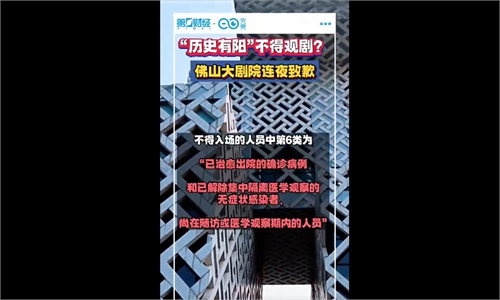Guangdong would not give ‘blue codes’ to those who have not been fully vaccinated: local health commission

Residents from Shenzhen, South China's Guangdong Province line up to take nucleic acid tests on July 24, 2022. Photo: IC
In response to the suggestion of a provincial people's congress deputy that those who fail to fulfill their personal responsibilities of epidemic prevention and control and those who fail to get fully vaccinated should be given "blue health codes," the health authorities in South China's Guangdong Province said they would not imply the blue code management for the time being.
Liu Shixing, a deputy of Guangdong Provincial People's Congress, suggested to the Guangdong Provincial Health Commission that "blue codes" should be given to those who fail to fulfill their personal responsibilities of epidemic prevention and control, including those who should take nucleic acid testing but have not been tested and those who have not been fully vaccinated.
The commission said on July 26 that they will not imply the "blue code" system so far for a few reasons. First reason is that there are no relevant policies to support such method at present.
Second, not all people are eligible for vaccination. Some people cannot be vaccinated or cannot be vaccinated temporarily due to vaccination taboos and "blue codes" may cause inconvenience to the normal activities of citizens, leading to people's incomprehension, lack of support and cooperation in implementing the policy.
Third, as the vaccination data of each province has not been connected to the national database, it is impossible to accurately judge and assign codes according to the vaccination situation in other provinces. Therefore, the grass-roots level needs to supplement the vaccination data from other provinces, which will greatly increase the extra burden of the grass-roots level.
Fourth, along with China's policy adjustment and demand changes of vaccination manufacturers, vaccination recommendations and requirements are also different in different groups of people. Besides, the code assignment judgment rules are complex, which needs to be adjusted frequently. If the adjustment is not timely or the rule of judgment is not accurate, it may cause errors.
The commission said according to the current epidemiological investigation, people who stayed in key places for more than a certain period of time are classified as high-risk persons and they will be assign yellow health code. Such personnel should undergo nucleic acid testing as required before they can be converted to green code. The target proposed by the deputy of the provincial people's congress has already been initially achieved.
Previous practice has proved that assigning health codes to people at risk is an effective means of management, the commission said.
In the next step, the commission will work with other departments to timely revise and improve the code assignment in accordance with the relevant regulations of national health code management and the actual situation of epidemic prevention and control in Guangdong and strengthen data source management. "We will also report suggestions from the provincial people's congress back to the national level in due course," the commission noted.
The ninth version of the COVID-19 prevention and control protocols has made it very clear that COVID-19 vaccination must be conducted under informed consent and voluntary participation.
For the regulations that restrict unvaccinated people or those who were formerly infected with COVID-19 from entering certain venues, various regions have made corrections.
To deal with overly strict anti-epidemic policies imposed by some local authorities, the State Council's joint prevention and control mechanism has established a platform on the website of the National Health Commission for people to report controversial regulations.
Global Times


